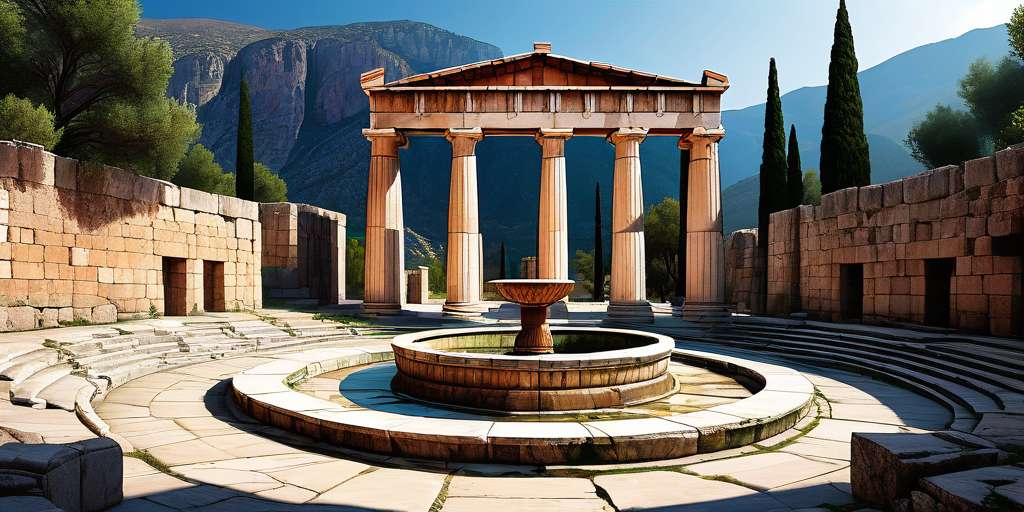The Oracle of Delphi, located in ancient Greece, was an important center of advice and guidance in decision-making.
Dedicated to the god Apollo, its history dates back to legendary times.
The oracle was consulted by people from all walks of life and its predictions influenced the decisions of rulers and citizens.
In this article, we will explore the history of the Delphic Oracle, its functioning and its significance in Greek society.
In addition, we will address its legacy today and the mysteries that still surround this enigmatic place.
History of the Oracle of Delphi
The Oracle of Delphi, located in the valley of the Pleisto, was one of the main oracles of ancient Greece.
Its origins date back to a small village that later gave rise to the sanctuary dedicated to the god Apollo.
This sanctuary, known as Pito, was considered a sacred place where the muses and nymphs of the springs gathered.
Location and context of the Oracle
The sanctuary of the Oracle of Delphi was located in a mountainous region of central Greece, surrounded by beautiful landscapes and hills.
It was strategically located, as it was at a crossroads of important trade routes, which favored its growth and development over the centuries.
The Pleisto valley, where Delphi was located, was considered a special and mystical place.
The Castalia spring, surrounded by a laurel forest, was one of the main attractions of the sanctuary.
In addition, it was believed that a mythological dragon named Delphinus guarded the place before the arrival of Apollo.
The role of Apollo in the Oracle
Apollo, the god of light and music, was the main god to whom the Oracle of Delphi was consecrated.
Apollo was believed to communicate through the Pythia, a woman chosen to interpret divine responses.
The presence of Apollo at Delphi was significant, as he was associated with wisdom and knowledge.
As the cult of Apollo gained prominence, the sanctuary at Delphi became a place of pilgrimage and consultation for people from all walks of life.
Rulers and ordinary citizens turned to the Oracle for advice and guidance in making important decisions, reflecting the influence and power the Oracle had in Greek society.
Legends and myths associated with the Oracle
The Oracle of Delphi is shrouded in numerous legends and myths.
One of the most famous stories is that of Oedipus, whose tragic fate was foretold by the Oracle.
There is also the story of how Apollo took over the sanctuary of Delphi by defeating the demonic serpent Python, who guarded the place before.
These legends and myths contribute to the fascination and mystery surrounding the Oracle of Delphi, enhancing its reputation as a sacred place full of divine powers.
Over the centuries, these stories have endured and have influenced the image and significance of the Oracle in Greek society and beyond.
Functioning of the Delphic Oracle
The Oracle of Delphi had an elaborate system of operation, in which different aspects were involved.
In the following, we will explore the role of the Pythia in divine interpretation, the process of consulting the Oracle and the influence she had on decision making.
The role of the Pythia in divine interpretation
The Pythia, also known as the priestess of Apollo, played a crucial role in the functioning of the Oracle.
She was a woman chosen without distinction of class, whose life and habits had to be irreproachable.
She lived in the sanctuary for life and during the Oracle’s peak years, up to three pythonesses were appointed to attend to consultations.
However, in times of decadence there was only one.
The Pythia was in charge of interpreting the divine answers and communicating them to those who consulted her.
To do so, she purified herself in the Castalia fountain and made offerings to Apollo.
A crucial moment for the interpretation was when cold water was poured over a goat, and if the goat shivered, it was considered a sign that Apollo was present and the Pythia began to interpret the answers.
The Oracle consultation process
Consultants had the opportunity to consult the Oracle a few days before the 7th day of each month, considered the birth of Apollo.
However, during the winter, these consultations were not carried out, since it was believed that Apollo traveled to the country of the Hyperboreans at that time.
In order to access the Oracle, the consultants had to make a tour of the area, passing through the Castalia fountain and the Via Sacra until they reached the temple of Apollo.
On the way, the treasuries of the cities were found, where votive offerings and donations were kept.
Once in the temple, the necessary sacrifices or offerings were acquired to pay for the consultation to the Oracle.
The influence of the Oracle on decision making
As we have seen above, the predictions of the Oracle of Delphi had a great impact on the political and social decisions of the time.
Both rulers and citizens consulted the Oracle for advice and guidance in making important decisions.
The Oracle’s answers influenced the policies and strategies of cities such as Athens and Sparta.
Sacred delegations from each city traveled to the sanctuary at times conducive to divination and were received by the ambassador from Delphi.
The priests and archives of the sanctuary also played an important role in the functioning of the Oracle, keeping a record of queries and responses.
The ‘Know thyself’ enigma
One of the most famous phrases associated with the Oracle of Delphi is the enigma of ‘Know thyself’.
This enigmatic expression, inscribed on the pediment of the temple of Apollo, represents an invitation to reflection and self-knowledge.
The Oracle, through its divine predictions, sought to help those who consulted deepen their own nature and understand their place in the world.
The importance of the Oracle in Greek society
The Oracle was also considered a sacred meeting place between the divine and the earthly.
The god Apollo was seen as the messenger of the gods and his voice was heard through the Pythia, the priestess who interpreted the divine answers.
This connection between the human world and the divine world gave the Oracle indisputable power and authority in Greek society.
The decline and legacy of the Oracle today
Throughout its history, the Oracle of Delphi suffered several catastrophes and looting, which caused its decadence and the decline of the cult.
However, its legacy endures as an example of the search for knowledge and wisdom in times past.
The archaeological remains of Delphi remain a major tourist destination today, attracting visitors seeking to immerse themselves in Greek history and mythology.
Although the Oracle no longer offers divine answers, its influence endures in the collective memory and in the reflection on the human being and his relationship with the transcendental.
The riddle of ‘Know thyself’ remains a reminder of the importance of introspection and understanding of our own being.
If you want to visit the Oracle of Delphi in person, here is an option that includes entrance to the archaeological site and a visit to the Museum with audio guide.
Subscribe
If you want to receive in your mailbox stories, curiosities and legends of the most fascinating creatures of classical mythology just fill in this form.
Continue reading
If you liked this article, you like mythology.
And in this case, we have much more to offer you.
Discover new adventures, heroes, nymphs, gods, battles, teachings…
Just click on the button.
mitologiaclasica.com is a website dedicated to explore and spread the fascinating richness of mythology, offering a vast compendium of stories, characters and legends.
Explore
Greek Mythology
Roman Mythology
Norse Mythology
Egyptian Mythology
Hindu Mythology
Chinese Mythology
Japanese Mythology
Celtic Mythology
Privacy Policy
Privacy Policy
Copyright mitologiaclasica.com


